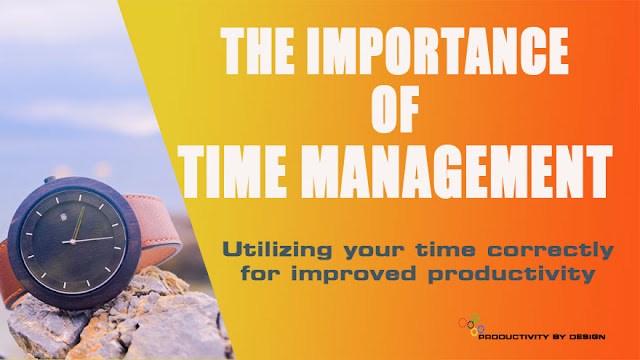
In today's fast-paced world, effective time management has become an essential skill for individuals and organizations alike.
By mastering the art of time management, you can significantly boost your productivity, reduce stress, and achieve your goals.
In this article, we'll delve into the importance of time management, common time-wasting habits, and practical strategies to help you optimize your time.
- The Importance of Time Management
- Common Time-Wasting Habits
- Practical Strategies for Effective Time Management
- Conclusion
The Importance of Time Management
Time management is a valuable skill that can have a profound impact on your personal and professional life.
Here are some key reasons why it's crucial:
- Enhanced Productivity: By prioritizing tasks and allocating specific time slots, you can significantly boost your productivity. Effective time management allows you to focus on high-impact activities, maximizing your output.
- Reduced Stress: When you have a clear plan and a well-organized schedule, you'll feel less stressed and overwhelmed. Time management helps you stay on top of your tasks, reducing anxiety and improving your overall well-being.
- Improved Work-Life Balance: By managing your time wisely, you can create a better balance between your work and personal life. Effective time management allows you to allocate time for leisure, hobbies, and family, leading to a more fulfilling life.
- Career Advancement: Strong time management skills are often valued by employers and can lead to career advancement. Demonstrating your ability to manage your time effectively can position you as a reliable and efficient employee.
- Increased Focus: By minimizing distractions, you can improve your focus and concentration on important tasks. Effective time management techniques, such as time blocking and the Pomodoro Technique, can help you stay focused and avoid distractions.
Common Time-Wasting Habits
Recognizing and addressing common time-wasting habits is crucial for effective time management. Here are some of the most common culprits:
- Procrastination: Putting off tasks can lead to a buildup of work and unnecessary stress. To combat procrastination, break down large tasks into smaller, more manageable steps and set realistic deadlines.
- Poor Prioritization: Not knowing which tasks are most important can lead to wasted time and missed deadlines. Use effective prioritization techniques, such as the Eisenhower Matrix, to categorize tasks based on urgency and importance.
- Excessive Multitasking: Trying to do too many things at once can reduce productivity and increase errors. Focus on one task at a time to improve your efficiency and accuracy.
- Distractions: Social media, email, and other distractions can significantly impact your productivity. Minimize distractions by creating a dedicated workspace, turning off notifications, and using website blockers.
- Lack of Planning: Failing to plan your day or week can lead to a chaotic and unproductive schedule. Use tools like calendars and planners to schedule your tasks and allocate specific time blocks.
Practical Strategies for Effective Time Management
Here are some practical strategies to help you improve your time management skills:
- Set Clear Goals: Define your short-term and long-term goals to give your work direction. Clear goals provide a sense of purpose and help you stay focused.
- Prioritize Tasks: Use effective prioritization techniques, such as the Eisenhower Matrix, to categorize tasks based on urgency and importance. Prioritizing tasks helps you allocate your time efficiently.
- Time Blocking: Allocate specific time blocks for different tasks to maintain focus. Time blocking helps you avoid multitasking and ensures that you allocate sufficient time for each task.
- Time Tracking: Monitor your time usage to identify time-wasting habits and areas for improvement. Time tracking tools can help you gain insights into how you spend your time and make necessary adjustments.
- Minimize Distractions: Create a dedicated workspace, turn off notifications, and use website blockers to stay focused. A clutter-free environment and minimal distractions can significantly improve your productivity.
- Learn to Say No: Don't overcommit yourself. Politely decline additional tasks if you're already overloaded. Saying no can help you avoid burnout and maintain a healthy work-life balance.
- Delegate Tasks: If possible, delegate tasks to others to free up your time. Delegating tasks can help you focus on high-priority activities and improve your overall efficiency.
- Take Breaks: Short breaks can help you stay refreshed and focused. Incorporate short breaks into your schedule to avoid burnout and maintain productivity.
Conclusion
Effective time management is a skill that can be learned and improved over time. By implementing these strategies and making conscious efforts to prioritize tasks, minimize distractions, and stay organized, you can significantly enhance your productivity and achieve your goals. Remember, time is a valuable resource, and how you manage it will directly impact your success.
Additional Tips for Effective Time Management:
- Use a Time Management App: Time management apps can help you track your time, set reminders, and prioritize tasks.
- Practice Mindfulness: Mindfulness techniques, such as meditation and deep breathing, can help you stay focused and reduce stress.
- Review and Adjust: Regularly review your time management strategies and make adjustments as needed.
- Celebrate Your Successes: Reward yourself for achieving your goals to stay motivated.


1 Comments